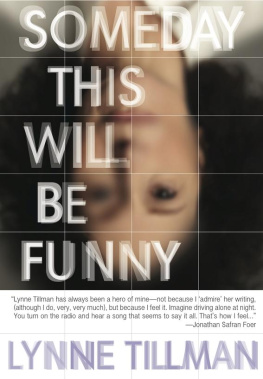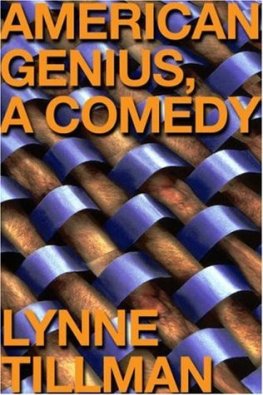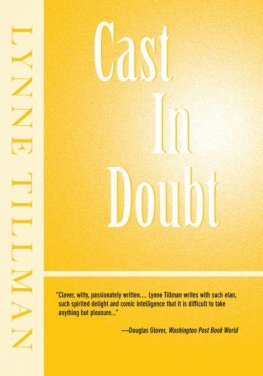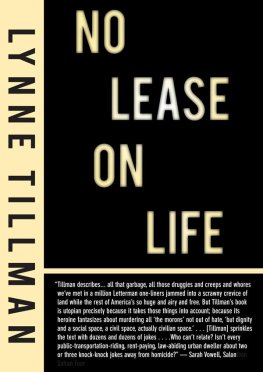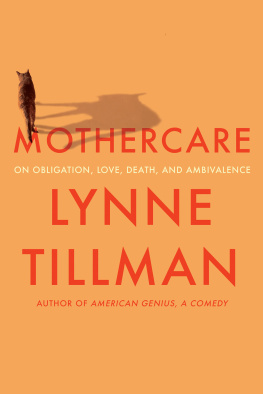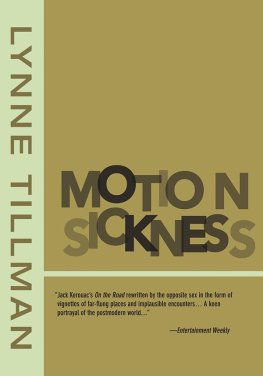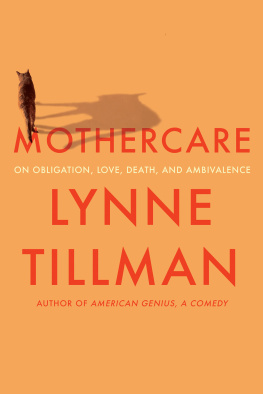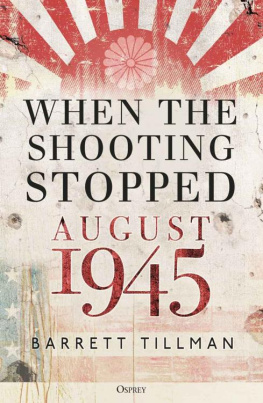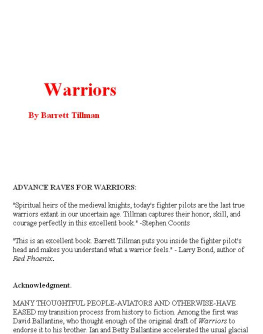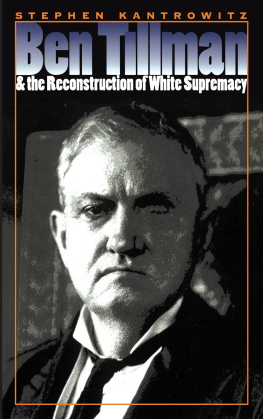Lynne Tillman - Someday This Will Be Funny
Here you can read online Lynne Tillman - Someday This Will Be Funny full text of the book (entire story) in english for free. Download pdf and epub, get meaning, cover and reviews about this ebook. year: 2011, publisher: Red Lemonade, genre: Art. Description of the work, (preface) as well as reviews are available. Best literature library LitArk.com created for fans of good reading and offers a wide selection of genres:
Romance novel
Science fiction
Adventure
Detective
Science
History
Home and family
Prose
Art
Politics
Computer
Non-fiction
Religion
Business
Children
Humor
Choose a favorite category and find really read worthwhile books. Enjoy immersion in the world of imagination, feel the emotions of the characters or learn something new for yourself, make an fascinating discovery.
- Book:Someday This Will Be Funny
- Author:
- Publisher:Red Lemonade
- Genre:
- Year:2011
- Rating:3 / 5
- Favourites:Add to favourites
- Your mark:
- 60
- 1
- 2
- 3
- 4
- 5
Someday This Will Be Funny: summary, description and annotation
We offer to read an annotation, description, summary or preface (depends on what the author of the book "Someday This Will Be Funny" wrote himself). If you haven't found the necessary information about the book — write in the comments, we will try to find it.
Someday This Will Be Funny — read online for free the complete book (whole text) full work
Below is the text of the book, divided by pages. System saving the place of the last page read, allows you to conveniently read the book "Someday This Will Be Funny" online for free, without having to search again every time where you left off. Put a bookmark, and you can go to the page where you finished reading at any time.
Font size:
Interval:
Bookmark:

Lynne Tillman is the author of five novels, three collections of short stories, one collection of essays, and two other nonfiction books. She collaborates often with artists and writes regularly on culture, and her fiction is anthologized widely. Her last collection of short stories, This Is Not It , included twenty-three stories based on the work of twenty-two contemporary artists. Her novels include American Genius, A Comedy (2006), No Lease on Life (1998), which was a New York Times Notable Book of 1998 and a finalist for the National Book Critics Circle Award, Cast in Doubt (1992), Motion Sickness (1991), and Haunted Houses (1987). The Broad Picture (1997) collected Tillmans essays, which were published in literary and art periodicals. She is the fiction editor at Fence Magazine, professor and writer-in-residence in the Department of English at the University at Albany, and a recent recipient of a Guggenheim Fellowship.
Self by Lynne Tillman, using Blackberry
Chartreuse
How abrupt she was. Shed handed him the glass of Chartreuse, and her wrist flicked upward. Her hands rebelling, he thought. Then she flinched. But she caught herself, she hadnt told him what actually happened, and she hadnt lied. Shed left room in their conversation for ambiguity. So this was the conversation he was in, but what about the others he hadnt been asked to join. His life was cycling into territory where gaps counted more. Mind the gap, but his mind was wandering.
In La Grande-Chartreuse, she said, also abruptly but with a laugh, as if to distract him, the head and celebrated monastery of the Carthusians, near Grenoble, the monks brewed Chartreuse. Its a liqueur or aperitifyou can have it before or aftermade from aromatic herbs and brandy. The recipe is an ancient secret.
She visited the monastery years ago, crossing the Channel as a teenager, and pronounced the word herb the English way, its h heavy and funny as the mans name.
Pope Victor III, Bruno of Cologne, founded the order in 1086. Twenty years after the Norman invasion...
He interrupted her then, he remembered he interrupted her, and she hated that. When the English language suffered a loss of prestige, but you still keep that hard h, dont you?
She drank some more, while he told her the color of Chartreuse looked sick, even feverish, but maybe the weird yellow and green high-voltage potion held an alluring illness, laced with the charge of deception. Her cheeks flared scarlet, the garish liqueur having its way with her. It burned his throat, too. But she kept her tongue, and her ruse, if it was one, wasnt even bruised. He wasnt going to force the issue, it would be like rape, and who wants truth or sex that way. He swallowed the yellow/green liqueur, distasteful and medicinal. Then he poured them both another Chartreuse.
A kind of golden amnesia stilled other monologues inside him. Her shirt, chartreuse for the occasiontheir fifth anniversarywinked ambivalently. She liked designing their nights, he thought, color combinations were her thing. He wondered how he fit in sometimes. Yellow elided with the green, never landing on the integrity of one color, and, he reflected sullenly, her blouse managed to be a fabric of lies, too. The silk looked sinister, too shiny, and, under the light, his wifes facade iridesced. Glimmering vile and then beautiful. Inconstant chartreuse numbed his tongue and his eyes.
This tastes disgusting, he said, finally. I could get used to it.
Absinthe, she explained, or he remembered she did, was called the green fairy, because it made everyone crazyeveryone became addicted, and there was legislation against it, still is, like against heroin, because they thought it would destroy French civilization.
Maybe it did.
But now you can find it, if you want. At a party I went to we all drank from the fairy cup.
She didnt find his eyes. Maybe it was then, he thought, that it happened.
The Carthusians were expelled from France in 1903, and they went to Tarragona. Spain.
Home of tarragon?
But they returned in 1941. He remembered thinking about the Popes treachery during the war.
Her blouse kept changing, now yellow, now green. It was kind of driving him crazy, but maybe it was the effect of Chartreuse. What she liked best about the Carthusian monks was their vow of absolute silenceit was the most rigorous order. Resolute religiosos, she joked, who, paradoxically, brewed a high-volume alcoholic drink. She figured they didnt indulge, because it might loosen their tongues.
In 1960, there were only 537 Carthusians, she said.
Your tongue isnt loose, he said.
Im thinking of going on a retreatI want to be silent.
Leave the conversation? he asked.
Youre too ironic for words.
You got me.
Just what he expected of her, to run; but what did he expect of her. He toasted her with the Manichean aperitif or liqueur, whatever it was. Her reticence settled over him like a green or yellow cloud. With it, she left. She spent half a year away, in silence, or at least she didnt talk to him. He had to trust her, he supposed. She stayed with a very small order of Carthusian nuns, who didnt drink Chartreuse. He condemned himself for not pursuing her there.
While she was away, he spoke of his perplexity to his therapist, who was not silent enough. Loyalty, betrayal, living with the lie, not escaping it, the way some fled from what was supposed to be truehe wrote notes to himself about honest disillusionment. To others, within this mostly quiet time, sometimes he was shameless and blatant. He once declared at a cocktail party, a fragile glass of Chartreusehis drink nowin his hand, Fidelity and infidelity, whats one without the other? You cant imagine a mountainless valley, can you? With a secret-holders thrill at disclosure, he told his therapist: I love her. I live inside an illusion. A shimmering criminal illusion.
On weekends, he hit stores and developed the habit of collecting shirts and jackets of chartreuse. The dubious shade represented his obsession with transparency and opacity. Now he thought it was one thing, and he could see right through it and her. Then it was another, and she was denser than a black hole. He wished he were the Hubble telescope.
Chartreuse was popular, the new grey, he liked to say, and his closet was full when she returned. Her need for silenceat least with himhadnt completely abated. He never knew if it was because she had once deceived him or because she couldnt stop. Or because his once having thought she did horrified her, when she hadnt, and now she wanted to and couldnt.
He contented himself with the little things, his and her chartreuse towels, how they equitably divided choresthe pleasure of domesticity stayed novel for himand her occasional marital passion. Like him, she fashioned herself daily, a devotee of Harold Rosenbergs tradition of the new. So eventually they would turn old-fashioned. At least, they were together.
He would always associate the night it happened, when he thought it happened, with fateful chartreuse, whose eternal shiftiness he could spin tales about. Also, about the CIA, the monastery as the first factory, and the beauty of silence. It was really golden. He and his wife celebrated themselves and their differences on their anniversary. They loved and denied each other, simultaneously, and more and more laughed at themselves. There were things hed never know. Still, nothing competed with their complicity, their chartreuse hours together.
Dear Ollie
Dear Ollie,
Its been a long time. I think of you sometimes, and I know you think of me. I take a perverse satisfaction in that, even in the jaded ways you disguise me in your so-called fictions. I really dont care. But I just read your manifesto against the past. No one votes for guilt. I also have funny mental pictures of that mansion we lived in on the Hudson. It wasnt haunted, except by an unghostly Timothy Leary. Everyone said he dropped acid there. Everyone said they used to have wild parties. Even back then the term wild parties bothered me. No one ever gave details.
Font size:
Interval:
Bookmark:
Similar books «Someday This Will Be Funny»
Look at similar books to Someday This Will Be Funny. We have selected literature similar in name and meaning in the hope of providing readers with more options to find new, interesting, not yet read works.
Discussion, reviews of the book Someday This Will Be Funny and just readers' own opinions. Leave your comments, write what you think about the work, its meaning or the main characters. Specify what exactly you liked and what you didn't like, and why you think so.

